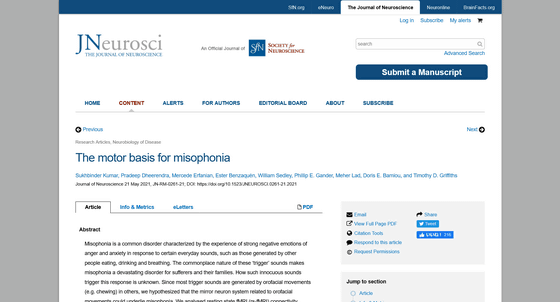The brain science reason of 'Misophonia' that is frustrated by the sounds of other people's meals and breath sounds is revealed

A disease that excessively dislikes the sounds that others make on a daily basis, such as the sounds of chewing, drinking, and breathing, is called
The motor basis for misophonia | Journal of Neuroscience
https://www.jneurosci.org/content/early/2021/05/20/JNEUROSCI.0261-21.2021

Research reveals why some find the sound of others eating so irritating | Neuroscience | The Guardian
https://www.theguardian.com/science/2021/may/24/research-reveals-why-some-find-the-sound-of-others-eating-so-irritating
Misophonia is called sound phobia or sound aversion, and is a medical disorder that causes a negative emotional reaction when you hear other people's chewing sounds, drinking sounds, and typing sounds. It has long been pointed out that the cause of misophonia is 'unusual information processing in the brain', but it was not clear what the specific difference was.
What is the cause of 'misophonia' that suffers in response to 'sound' such as typing and breathing? --GIGAZINE

A research team led by Sukhbinder Kumar of the Newcastle University Institute for Biosciences hypothesized that the cause of misophonia was a ' mirror neuron system' that overtraced the movements of others. This means that, for example, by seeing or hearing someone move their mouth when they mumble, the brain area for moving their mouth is activated even though they are not actually moving their mouth. Thing.
The researchers noted that most of the sounds that cause misophonia symptoms are 'sounds from facial movements,' and using fMRI, which can visualize the hemodynamic response of the brain and spinal cord, about 40 misophonia. The cranial nerve activity of the patient and 33 control groups was compared.
As a result, there was no difference in the activity of the auditory cortex , which is the brain region that controls hearing, between the misophonia patient group and the control group, but the misophonia patient group was more 'brain region that controls facial movement' than the control group. Was found to be strongly activated in response to the trigger sound.

From the results of this research, the research team found that misophonia is not 'due to the reaction of the brain to sound' but 'due to the motor system for producing sound', and the trigger sound becomes an information medium that conveys the movement of others. Insisted that there was. Kumar says that if it is proved in the future that misophonia is due to the mirror neuron system, more effective treatments for misophonia may be discovered.
Related Posts:
in Science, Posted by log1i_yk






